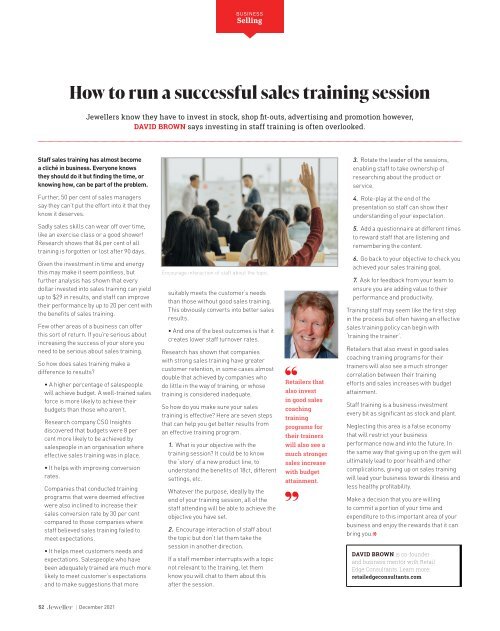Jeweller - December 2021
• Created increase: lab-created diamond sales forecast to double by 2025 • Golden touch: is it true that rising gold price decreases jewellery sales? • Risky customers: identify and remedy your 'at-risk' customers
• Created increase: lab-created diamond sales forecast to double by 2025
• Golden touch: is it true that rising gold price decreases jewellery sales?
• Risky customers: identify and remedy your 'at-risk' customers
You also want an ePaper? Increase the reach of your titles
YUMPU automatically turns print PDFs into web optimized ePapers that Google loves.
BUSINESS<br />
Selling<br />
How to run a successful sales training session<br />
<strong>Jeweller</strong>s know they have to invest in stock, shop fit-outs, advertising and promotion however,<br />
DAVID BROWN says investing in staff training is often overlooked.<br />
Staff sales training has almost become<br />
a cliché in business. Everyone knows<br />
they should do it but finding the time, or<br />
knowing how, can be part of the problem.<br />
3. Rotate the leader of the sessions,<br />
enabling staff to take ownership of<br />
researching about the product or<br />
service.<br />
Further, 50 per cent of sales managers<br />
say they can’t put the effort into it that they<br />
know it deserves.<br />
4. Role-play at the end of the<br />
presentation so staff can show their<br />
understanding of your expectation.<br />
Sadly sales skills can wear off over time,<br />
like an exercise class or a good shower!<br />
Research shows that 84 per cent of all<br />
training is forgotten or lost after 90 days.<br />
Given the investment in time and energy<br />
this may make it seem pointless, but<br />
further analysis has shown that every<br />
dollar invested into sales training can yield<br />
up to $29 in results, and staff can improve<br />
their performance by up to 20 per cent with<br />
the benefits of sales training.<br />
Few other areas of a business can offer<br />
this sort of return. If you’re serious about<br />
increasing the success of your store you<br />
need to be serious about sales training.<br />
So how does sales training make a<br />
difference to results?<br />
• A higher percentage of salespeople<br />
will achieve budget. A well-trained sales<br />
force is more likely to achieve their<br />
budgets than those who aren’t.<br />
Research company CSO Insights<br />
discovered that budgets were 8 per<br />
cent more likely to be achieved by<br />
salespeople in an organisation where<br />
effective sales training was in place.<br />
• It helps with improving conversion<br />
rates.<br />
Companies that conducted training<br />
programs that were deemed effective<br />
were also inclined to increase their<br />
sales conversion rate by 30 per cent<br />
compared to those companies where<br />
staff believed sales training failed to<br />
meet expectations.<br />
• It helps meet customers needs and<br />
expectations. Salespeople who have<br />
been adequately trained are much more<br />
likely to meet customer’s expectations<br />
and to make suggestions that more<br />
Encourage interaction of staff about the topic.<br />
suitably meets the customer’s needs<br />
than those without good sales training.<br />
This obviously converts into better sales<br />
results.<br />
• And one of the best outcomes is that it<br />
creates lower staff turnover rates.<br />
Research has shown that companies<br />
with strong sales training have greater<br />
customer retention, in some cases almost<br />
double that achieved by companies who<br />
do little in the way of training, or whose<br />
training is considered inadequate.<br />
So how do you make sure your sales<br />
training is effective? Here are seven steps<br />
that can help you get better results from<br />
an effective training program.<br />
1. What is your objective with the<br />
training session? It could be to know<br />
the ‘story’ of a new product line, to<br />
understand the benefits of 18ct, different<br />
settings, etc.<br />
Whatever the purpose, ideally by the<br />
end of your training session, all of the<br />
staff attending will be able to achieve the<br />
objective you have set.<br />
2. Encourage interaction of staff about<br />
the topic but don’t let them take the<br />
session in another direction.<br />
If a staff member interrupts with a topic<br />
not relevant to the training, let them<br />
know you will chat to them about this<br />
after the session.<br />
Retailers that<br />
also invest<br />
in good sales<br />
coaching<br />
training<br />
programs for<br />
their trainers<br />
will also see a<br />
much stronger<br />
sales increase<br />
with budget<br />
attainment.<br />
5. Add a questionnaire at different times<br />
to reward staff that are listening and<br />
remembering the content.<br />
6. Go back to your objective to check you<br />
achieved your sales training goal.<br />
7. Ask for feedback from your team to<br />
ensure you are adding value to their<br />
performance and productivity.<br />
Training staff may seem like the first step<br />
in the process but often having an effective<br />
sales training policy can begin with<br />
‘training the trainer’.<br />
Retailers that also invest in good sales<br />
coaching training programs for their<br />
trainers will also see a much stronger<br />
correlation between their training<br />
efforts and sales increases with budget<br />
attainment.<br />
Staff training is a business investment<br />
every bit as significant as stock and plant.<br />
Neglecting this area is a false economy<br />
that will restrict your business<br />
performance now and into the future. In<br />
the same way that giving up on the gym will<br />
ultimately lead to poor health and other<br />
complications, giving up on sales training<br />
will lead your business towards illness and<br />
less healthy profitability.<br />
Make a decision that you are willing<br />
to commit a portion of your time and<br />
expenditure to this important area of your<br />
business and enjoy the rewards that it can<br />
bring you.<br />
DAVID BROWN is co-founder<br />
and business mentor with Retail<br />
Edge Consultants. Learn more:<br />
retailedgeconsultants.com<br />
52 | <strong>December</strong> <strong>2021</strong>


















